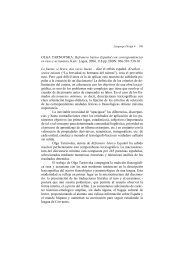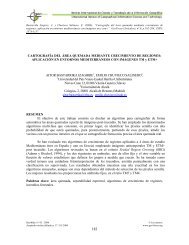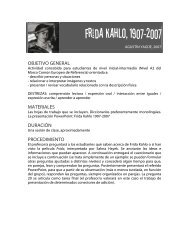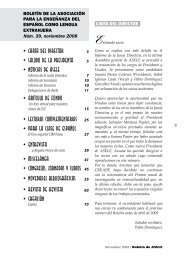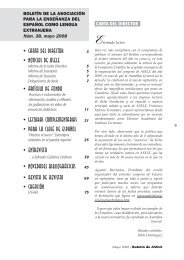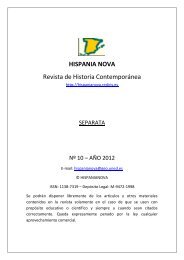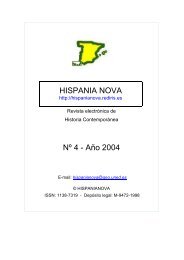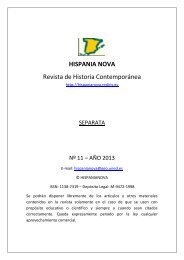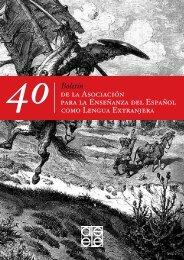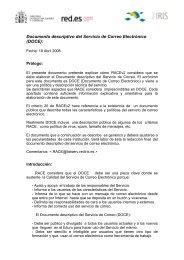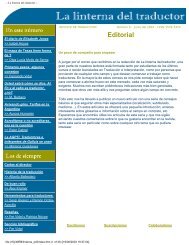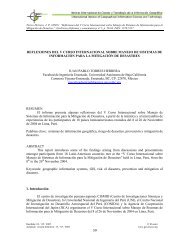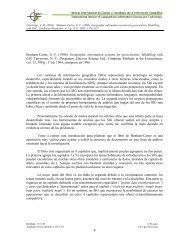- Page 1 and 2:
ResumenPalabras claveTeoría Sentid
- Page 3 and 4:
ResumenKeywordsMeaning Text Theory,
- Page 5 and 6:
ÍndiceÍndicePalabras clave ......
- Page 7 and 8:
Índice2.3.1.3. ‘Medio de transpo
- Page 9:
Índice5.2. Aplicación del princip
- Page 12 and 13:
Tabla 34: Colocaciones de la UL ord
- Page 14 and 15:
Índice de esquemasEsquema 1: Entra
- Page 16 and 17:
xvi
- Page 19:
Listado de Funciones LéxicasListad
- Page 22 and 23:
Alonso (sin tu tesis, este trabajo
- Page 25 and 26:
Introducción0. IntroducciónEl pre
- Page 27 and 28:
IntroducciónEl modelo se basa en e
- Page 29 and 30:
Introducciónb) un semi-frasema o c
- Page 31 and 32:
IntroducciónEn la mayoría de las
- Page 33 and 34:
IntroducciónOper 2 (clase) = recib
- Page 35 and 36:
Introducciónfunción/finalidad’
- Page 37 and 38:
Introducciónb) Una forma proposici
- Page 39 and 40:
Introducciónredactadas manualmente
- Page 41 and 42:
IntroducciónFL dada, f, es una fun
- Page 43 and 44:
Introducciónlas colocaciones que n
- Page 45 and 46:
IntroducciónSi volvemos a CausFunc
- Page 47 and 48:
Introducciónotra, exigía acotar d
- Page 49 and 50:
Introducciónpropósito del caso ha
- Page 51 and 52:
Introduccióninnecesarias en las en
- Page 53 and 54:
Introducción0.4.4. El principio de
- Page 55 and 56:
IntroducciónPor último se añadie
- Page 57 and 58:
Introducciónestudia la relación d
- Page 59 and 60:
Capítulo 1Funciones léxicas y tip
- Page 61 and 62:
Capítulo 1Funciones léxicas y tip
- Page 63 and 64:
Capítulo 1Funciones léxicas y tip
- Page 65 and 66:
Capítulo 1Funciones léxicas y tip
- Page 67 and 68:
Capítulo 1Funciones léxicas y tip
- Page 69 and 70:
Capítulo 1Funciones léxicas y tip
- Page 71 and 72:
Capítulo 1Funciones léxicas y tip
- Page 73 and 74:
Capítulo 1Funciones léxicas y tip
- Page 75 and 76:
Capítulo 1Funciones léxicas y tip
- Page 77 and 78:
Capítulo 1Funciones léxicas y tip
- Page 79 and 80:
Capítulo 1Funciones léxicas y tip
- Page 81 and 82:
Capítulo 1Funciones léxicas y tip
- Page 83 and 84:
Capítulo 1Funciones léxicas y tip
- Page 85 and 86:
Capítulo 1Funciones léxicas y tip
- Page 87 and 88:
Capítulo 1Funciones léxicas y tip
- Page 89 and 90:
Capítulo 1Funciones léxicas y tip
- Page 91 and 92:
Capítulo 1Funciones léxicas y tip
- Page 93 and 94:
Capítulo 1Funciones léxicas y tip
- Page 95 and 96:
Capítulo 1Funciones léxicas y tip
- Page 97 and 98:
Capítulo 1Funciones léxicas y tip
- Page 99 and 100:
Capítulo 1Funciones léxicas y tip
- Page 101 and 102:
Capítulo 1Funciones léxicas y tip
- Page 103 and 104:
Capítulo 1Funciones léxicas y tip
- Page 105 and 106:
Capítulo 1Funciones léxicas y tip
- Page 107 and 108:
Capítulo 1Funciones léxicas y tip
- Page 109 and 110:
Capítulo 1Funciones léxicas y tip
- Page 111 and 112:
Capítulo 1Funciones léxicas y tip
- Page 113 and 114:
Capítulo 1Funciones léxicas y tip
- Page 115 and 116:
Capítulo 1Funciones léxicas y tip
- Page 117 and 118:
Capítulo 1Funciones léxicas y tip
- Page 119 and 120:
Capítulo 1Funciones léxicas y tip
- Page 121 and 122:
Capítulo 1Funciones léxicas y tip
- Page 123 and 124:
Capítulo 1Funciones léxicas y tip
- Page 125 and 126:
Capítulo 1Funciones léxicas y tip
- Page 127 and 128:
Capítulo 1Funciones léxicas y tip
- Page 129:
Capítulo 1Funciones léxicas y tip
- Page 132 and 133:
María A. Barriosb) Sustantivos de
- Page 134 and 135:
María A. BarriosApresjan (2001) se
- Page 136 and 137:
María A. Barrios2.1.1. Caracterís
- Page 138 and 139:
María A. Barriosmencionadas:La Fig
- Page 140 and 141:
María A. BarriosComo indica Alonso
- Page 142 and 143:
María A. BarriosFL Sentido de la F
- Page 144 and 145:
María A. Barrios(1999) indica que
- Page 146 and 147:
María A. BarriosA nuestro juicio e
- Page 148 and 149:
María A. Barriosse les excluye del
- Page 150 and 151:
María A. BarriosEs decir, la utili
- Page 152 and 153:
María A. BarriosEl hecho de que la
- Page 154 and 155:
María A. Barriosacusar, denunciar,
- Page 156 and 157:
María A. BarriosAlgo similar ocurr
- Page 158 and 159:
María A. BarriosLe Petit Robert se
- Page 160 and 161:
María A. Barriosargumentativos a p
- Page 162 and 163:
María A. Barrios*crítica negativa
- Page 164 and 165:
María A. Barriospromesa estará el
- Page 166 and 167:
María A. Barriosmuchos. Como funci
- Page 168 and 169:
María A. BarriosFL Etiqueta semán
- Page 170 and 171:
María A. Barriosetiquetas semánti
- Page 172 and 173:
María A. BarriosFL Etiqueta semán
- Page 174 and 175:
María A. BarriosFL Etiqueta semán
- Page 176 and 177:
María A. BarriosUn aspecto interes
- Page 178 and 179:
María A. Barriosvarias academias,
- Page 180 and 181:
María A. BarriosPor último, algun
- Page 182 and 183:
María A. Barrios‘oírse’ 246 ;
- Page 184 and 185:
María A. Barriossemántica 251 . E
- Page 186 and 187:
María A. Barriosexista un único s
- Page 188 and 189:
María A. BarriosDe nuevo, pues, no
- Page 190 and 191:
María A. BarriosFL Glosa Etiqueta
- Page 192 and 193:
María A. Barrios2.3.3. Dominio de
- Page 194 and 195:
María A. Barrios2.4. Valores de lo
- Page 196 and 197:
María A. Barriosse combinan con el
- Page 198 and 199:
María A. Barriosseñala que en la
- Page 200 and 201:
María A. BarriosLa búsqueda del s
- Page 202 and 203:
María A. Barriosvinculado a la FL
- Page 204 and 205:
María A. Barriospertenecientes al
- Page 206 and 207:
María A. Barriosmodificadores no s
- Page 208 and 209:
María A. Barrioscubiertas por Oper
- Page 210 and 211:
María A. Barrios‘emitir’ y gru
- Page 212 and 213:
María A. Barrios60). El aspecto l
- Page 214 and 215:
María A. Barriosa’ para Func i ,
- Page 216 and 217:
María A. Barriosde tres argumentos
- Page 218 and 219:
María A. Barriosuno o dos actantes
- Page 220 and 221:
María A. Barrios‘interrogatorio
- Page 222 and 223:
María A. Barriosaparecen en posici
- Page 224 and 225:
María A. Barriosque se refleja en
- Page 226 and 227:
María A. Barrios(90) C 0(V) S 0 (C
- Page 228 and 229:
María A. BarriosFL Etiqueta semán
- Page 230 and 231:
María A. BarriosAlgunas de las eti
- Page 232 and 233:
María A. Barrioscolocaciones cubie
- Page 234 and 235:
María A. Barriosusos 308 : torment
- Page 236 and 237:
María A. Barrios3.3.1.3. Situació
- Page 238 and 239:
María A. Barriosolor se produzca i
- Page 240 and 241:
María A. BarriosACCIÓN ILEGAL, y
- Page 242 and 243:
María A. BarriosComo en otras ocas
- Page 244 and 245:
María A. Barriosactantes de estos
- Page 246 and 247:
María A. Barrios3.3.3.5.2. Enferme
- Page 248 and 249:
María A. Barrios‘Señal superfic
- Page 250 and 251:
María A. Barriosorganizador; lo mi
- Page 252 and 253:
María A. Barrios3.4. Valores de ve
- Page 254 and 255:
María A. Barriosvalores de Func. E
- Page 256 and 257:
María A. Barrioscolocación cubier
- Page 258 and 259:
María A. BarriosHemos denominado s
- Page 260 and 261:
María A. Barriosinspiración, parp
- Page 262 and 263:
María A. BarriosAlgunos sustantivo
- Page 264 and 265:
María A. BarriosUL = S0 V0 Colocac
- Page 266 and 267:
María A. BarriosUL = S0 Etiquetase
- Page 268 and 269:
María A. Barriosd. La observación
- Page 270 and 271:
María A. Barriospuede expresar una
- Page 273 and 274:
Capítulo 4Funciones léxicas fasal
- Page 275 and 276:
Capítulo 4Funciones léxicas fasal
- Page 277 and 278:
Capítulo 4Funciones léxicas fasal
- Page 279 and 280:
Capítulo 4Funciones léxicas fasal
- Page 281 and 282:
Capítulo 4Funciones léxicas fasal
- Page 283 and 284:
Capítulo 4Funciones léxicas fasal
- Page 285 and 286:
Capítulo 4Funciones léxicas fasal
- Page 287 and 288:
Capítulo 4Funciones léxicas fasal
- Page 289 and 290:
Capítulo 4Funciones léxicas fasal
- Page 291 and 292:
Capítulo 4Funciones léxicas fasal
- Page 293 and 294:
Capítulo 4Funciones léxicas fasal
- Page 295 and 296:
Capítulo 4Funciones léxicas fasal
- Page 297 and 298:
Capítulo 4Funciones léxicas fasal
- Page 299 and 300:
Capítulo 4Funciones léxicas fasal
- Page 301 and 302:
Capítulo 4Funciones léxicas fasal
- Page 303 and 304:
Capítulo 4Funciones léxicas fasal
- Page 305 and 306:
Capítulo 4Funciones léxicas fasal
- Page 307 and 308:
Capítulo 4Funciones léxicas fasal
- Page 309 and 310:
Capítulo 4Funciones léxicas fasal
- Page 311 and 312:
Capítulo 4Funciones léxicas fasal
- Page 313 and 314:
Capítulo 4Funciones léxicas fasal
- Page 315 and 316:
Capítulo 4Funciones léxicas fasal
- Page 317 and 318:
Capítulo 4Funciones léxicas fasal
- Page 319 and 320:
Capítulo 4Funciones léxicas fasal
- Page 321 and 322:
Capítulo 4Funciones léxicas fasal
- Page 323 and 324:
Capítulo 4Funciones léxicas fasal
- Page 325 and 326:
Capítulo 4Funciones léxicas fasal
- Page 327 and 328:
Capítulo 4Funciones léxicas fasal
- Page 329:
Capítulo 4Funciones léxicas fasal
- Page 332 and 333:
María A. BarriosConsideremos, por
- Page 334 and 335:
María A. Barriosherencia léxica.
- Page 336 and 337:
María A. Barrios5.1.1. Caracterís
- Page 338 and 339:
María A. Barrioses correr, circula
- Page 340 and 341:
María A. BarriosCaus 3 Caus 3 Real
- Page 342 and 343:
María A. Barriosproblemas, pues pa
- Page 344 and 345:
María A. Barriosrepresenta el prim
- Page 346 and 347:
María A. BarriosCausFactiCausFact
- Page 348 and 349:
María A. BarriosA continuación, a
- Page 350 and 351:
María A. Barrios5.1.4.2. Caus vs.
- Page 352 and 353:
María A. Barrioscubiertas por Fact
- Page 354 and 355:
María A. BarriosSin embargo, como
- Page 356 and 357:
María A. Barriosalguien a la droga
- Page 358 and 359:
María A. Barriosempiece a existir
- Page 360 and 361:
María A. Barriosgemido, pegar un g
- Page 362 and 363:
María A. BarriosDicouèbe, se podr
- Page 364 and 365:
María A. BarriosComenzaremos por l
- Page 366 and 367:
María A. BarriosENERGÍA, emitir g
- Page 368 and 369:
María A. BarriosESTADO: acordar un
- Page 370 and 371:
María A. BarriosOtras UULL ajenas
- Page 372 and 373:
María A. BarriosDAR1. Causar que a
- Page 374 and 375:
María A. BarriosABRIR1. Causar que
- Page 376 and 377:
María A. BarriosLas UULL que sólo
- Page 378 and 379:
María A. Barrioscausativas formada
- Page 380 and 381:
María A. BarriosEl tercer apartado
- Page 382 and 383:
María A. BarriosComo se vio en el
- Page 384 and 385:
María A. BarriosFFLL que la compon
- Page 386 and 387:
María A. Barriosque despierta ‘a
- Page 388 and 389:
María A. Barriosel solapamiento es
- Page 390 and 391:
María A. Barrios‘hacer un expedi
- Page 392 and 393:
María A. Barriospor FinFunc 1 , si
- Page 394 and 395:
María A. BarriosA f B f’ Cabc123
- Page 396 and 397:
María A. BarriosFact 0Causdeseocig
- Page 398 and 399:
María A. Barriospodemos admitir qu
- Page 400 and 401:
María A. Barriosllegar n.n.n tambi
- Page 402 and 403:
María A. Barriosa existir’− cu
- Page 404 and 405:
María A. BarriosNuestra propuesta
- Page 406 and 407: María A. Barrios(226) LiquFact 0 (
- Page 408 and 409: María A. Barriosprecedentes, relat
- Page 410 and 411: María A. Barrioslas otras FFLL fas
- Page 412 and 413: María A. Barrios(257) Pred perm [P
- Page 414 and 415: María A. Barrios(confróntese en D
- Page 416 and 417: María A. Barrios(267) ‘intense(l
- Page 418 and 419: María A. BarriosEn otros trabajos
- Page 420 and 421: María A. Barrios6.5.2. FFLL, rasgo
- Page 422 and 423: María A. BarriosDESCASCARILLAR1. [
- Page 424 and 425: María A. Barriosimpone la condici
- Page 426 and 427: María A. Barriosdistingue tres tip
- Page 428 and 429: María A. Barrios6.6.2. Funciones l
- Page 430 and 431: María A. Barriosde ‘plato prepar
- Page 432 and 433: María A. Barrios‘momentos del d
- Page 434 and 435: María A. BarriosPlanosemánticoPla
- Page 436 and 437: María A. Barriossuene’ (que expr
- Page 438 and 439: María A. BarriosRecordemos tambié
- Page 440 and 441: María A. Barriosalguien se tropiec
- Page 442 and 443: María A. BarriosPensamos que las g
- Page 444 and 445: María A. Barriostemporal, donde te
- Page 446 and 447: María A. BarriosObjeto materialRec
- Page 448 and 449: María A. Barriosmandamiento, prome
- Page 450 and 451: María A. Barrioscombinatoria y las
- Page 452 and 453: María A. BarriosPuesto que hay val
- Page 454 and 455: María A. Barriosverbo soporte son:
- Page 458 and 459: María A. Barrios(Mel’čuk and Wa
- Page 460 and 461: María A. Barrioswith durar and wit
- Page 463 and 464: Referencias bibliográficasReferenc
- Page 465 and 466: Referencias bibliográficasAPRESJAN
- Page 467 and 468: Referencias bibliográficasBOSQUE,
- Page 469 and 470: Referencias bibliográficasGIRY-SCH
- Page 471 and 472: Referencias bibliográficasKOIKE, K
- Page 473 and 474: Referencias bibliográficasMEL’Č
- Page 475 and 476: Referencias bibliográficasText The
- Page 477: Referencias bibliográficasDicciona



